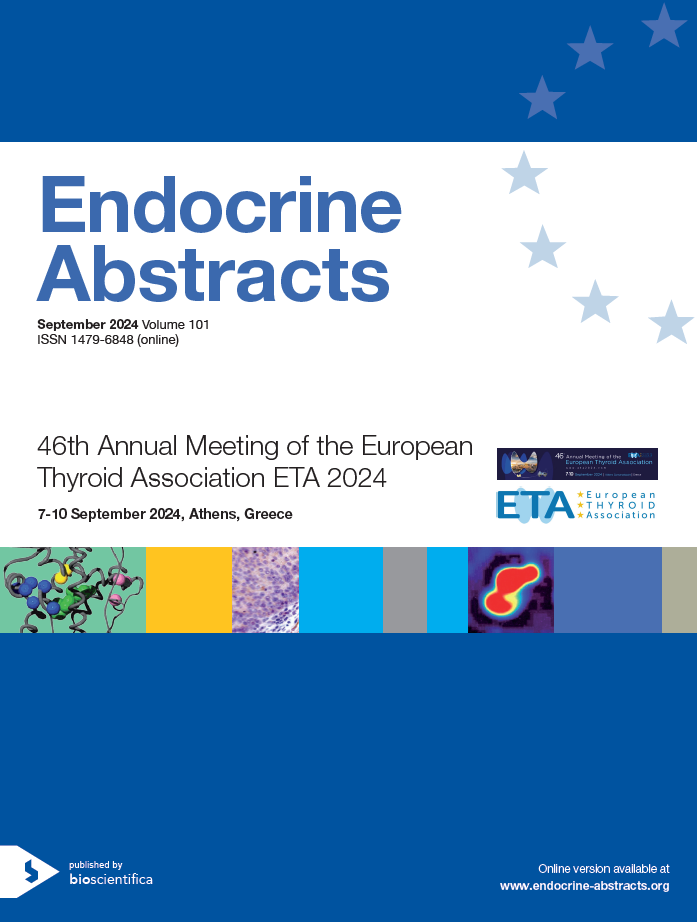
46th Annual Meeting of the European Thyroid Association (ETA) 2024
Poster Presentations
Intracellular effects of TH
ea0101ps2-10-01 | Intracellular effects of TH | ETA2024
Type 3 deiodinase is a negative prognostic marker for hepatocarcinoma
Luongo Cristina , Cossiga Valentina , Angela De Stefano Maria , Porcelli Tommaso , Ambrosio Raffaele , Guarino Maria , Troisi Roberto , Morisco Filomena , Salvatore Domenico
ea0101ps2-10-02 | Intracellular effects of TH | ETA2024
Non-genomic effects of thyroid hormones on the breast cancer microenvironment
Drago Leandro , Shahrivari Shabnam , Kohler Viktoria , Schwenk Nathalie , J. Nelson Peter , Hosseini Hedayatollah , Spitzweg Christine
ea0101ps2-10-03 | Intracellular effects of TH | ETA2024
Thyroid hormone receptor α is involved in pro- and anti-inflammatory properties of murine macrophages
Hoen Esmee , Falize Kim , Cheng Sheue-yann , van der Spek Anne , Boelen Anita
ea0101ps2-10-04 | Intracellular effects of TH | ETA2024
Unravelling the role of MCT8 in early brain development
Munoz-Falder Beatriz , Perez-Pestourie Alexia , Montero-Pedrazuela Ana , Guadano-Ferraz Ana , Barez-Lopez Soledad
ea0101ps2-10-05 | Intracellular effects of TH | ETA2024
Exploring the molecular mechanisms underlying radiation-induced thyroid damage using an organoid model
Maturi Rufina , Jellema Anne , De Vita Gabriella , Kruijff Schelto , Coppes Rob
ea0101ps2-10-06 | Intracellular effects of TH | ETA2024
The role of thyroid hormone receptor A1 (TRA1) signaling in parvalbumin-expressing interneurons in the central regulation of the cardiovascular system and anxiety-like behavior
Kolms Beke , Dore Riccardo , Sentis Sarah , Mittag Jens
ea0101ps2-10-07 | Intracellular effects of TH | ETA2024
Brain abnormalities in young mice harboring combined NKX2-1 and PAX8 gene mutations
Giacco Antonia , Iervolino Stefania , Cioffi Federica , Peluso Teresa , Mercurio Giovanna , Roberto Luca , de Rosa Valeria , Cammarota Mariarosaria , Varricchio Silvia , Staibano Stefania , Boscia Francesca , Maria Teresa Canzoniero Lorella , De Felice Mario , Ambrosino Concetta , Moreno Maria , Silvestri Elena
ea0101ps2-10-08 | Intracellular effects of TH | ETA2024
Regulation of hepatic mitochondrial quality control system by 3,5-diiodo-l-thyronine (3,5-t2) in a mouse model of high-fat diet-induced nafld
Cioffi Federica , Giacco Antonia , Petito Giuseppe , Scopigno Nicla , Mercurio Giovanna , Vigliotti Michela , Silvestri Elena , Senese Rosalba , Lanni Antonia
ea0101ps2-10-09 | Intracellular effects of TH | ETA2024
Exploring the role of DIO2 in the control of proliferation and cell fate determination in adult neural progenitors
Valcarcel-Hernandez Victor , Le Blay Karine , Guadano-Ferraz Ana , Remaud Sylvie
ea0101ps2-10-10 | Intracellular effects of TH | ETA2024
Impact of triiodothyronine (T3) on differentiation and T3-responsive characteristics in ipsc-derived hepatocyte-like cells to study energy and lipid metabolism
Seifert Joshua , Ludwik-Shah Katarzyna , von Kugelgen Nicolai , Jahn Regina , Kohrle Josef , Stachelscheid Harald , Wirth Eva



